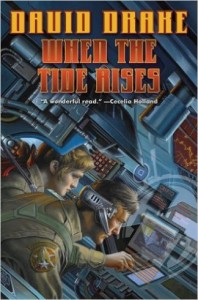The genesis of my RCN novels was Patrick O’Brian’s wonderful Aubrey/Maturin series, set during and after the Napoleonic Wars. It therefore won’t surprise many of you to find a number of plot points common to O’Brian’s last novels and When the Tide Rises. This is a case of convergent evolution, however, rather than direct borrowing on my part: we’re both working from Lord Cochrane’s memoirs of service under the revolutionary governments of Chili (sic) and Brazil.
Jack Aubrey and Daniel Leary are supporting independence movements as agents of their governments. In reality, the British government threatened Cochrane with prosecution if he accepted the Chilean offer, and the British warships which Cochrane encountered during his operations against the Spanish empire baulked him at every possible opportunity.
Mr O’Brian isn’t around to ask, but I suspect we diverge from Cochrane’s reality for the same reason. If you’re writing a series, you create an enormous problem for yourself if your hero is seen as a traitor by his government. Cochrane himself returned to favor, but it took more than thirty years for that to happen.
Lord Cochrane was skilled, intelligent, and personally brave. Having said that, his memoirs often make uncomfortable reading. It’s not that he was too stupid to see the political ramifications of his actions; rather, he looked on such considerations as unworthy of a superior being like himself. The political disasters which follow military victories throughout Cochrane’s career, with the Royal Navy and then with foreign governments, seem to the reader as inevitable as night following day.
Cochrane frequently says about the people with whom he dealt, “He swore to do something, but he didn’t carry through on his promises.” After a while, I became exasperated with this nonsense. Cochrane was an extremely intelligent and experienced man who must have expected the bad result. As with a woman who’s married three abusive drunks in a row, there’s more involved than bad luck or even bad judgment.
But what that means is that Cochrane was unwilling to work within the system when his undoubted brilliance made it possible for him to have done so. It is equally true that the systems he was involved with were deeply flawed–the Royal Navy in the early 19th century, and the South American revolutionary governments.
What comes through powerfully in every English memoir I’ve read involving Latin America at that time is that almost none of the players (Bolivar may have been a exception) had a concept of a nation that was greater than the individual’s own clan/family/tribe ruling as many of its neighbors as possible. Consistently when a region revolted from the colonial power (Spain or Portugal), the districts revolted from the capital and then the wealthy magnates revolted from the district government (which was generally run by one of the several powerful families in that district). The magnates than spent their time in burning out rival magnates.
If you’ve been following Latin American politics for the past fifty years or so (I suspect the problems go much farther back, but I personally don’t), you might reasonably come to the conclusion that nothing much has changed. For even more vivid modern examples of clan-based politics, consider Iraq and Afghanistan.
The business of When the Tide Rises is taken largely from real events in Chile, Peru, and Brazil. The major naval action, however, is based on the 1811 Battle of Lissa. (The 1866 Battle of Lissa is fascinating, but in fiction you couldn’t make one side as incompetent as the historical losing side was. As one example, the gun crews of the defeated flagship forgot to load shells and therefore fought the battle firing blank charges.)
I write to entertain readers, not to advance a personal or political philosophy (I don’t have a political philosophy); nonetheless, my fiction is almost always based on historical models. When you read When the Tide Rises, you might occasionally think about today’s news and remember that it’ll be tomorrow’s history.
Heaven knows, I thought about the news while I was writing.
–Dave Drake
